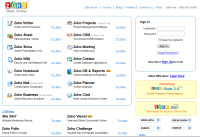Zoho for Your SOHO
You're probably familiar with Google Documents (word processor, spreadsheet, presentations). This is an application that raises blood pressure at Microsoft because it competes with Word, Excel, and Powerpoint. You may not have heard of Zoho, which also competes with Microsoft, but on a broader front. Zoho adds project management, customer relations management, a wiki application, and more. Zoho has been around since 2005 and it a subsidiary of AdventNet, which was founded in 1996 to create "affordable software for businesses". For a company such as this to challenge Microsoft is ironic.
 When Microsoft got started, it was little more than a garage operation and it came to challenge IBM for supremacy. Now another startup is challenging Microsoft. But the irony goes beyond that. Twenty-five years ago, all computing was centralized. You might have had a terminal on your desk, but the applications lived on a mainframe or a minicomputer. Files were all stored on the main computer. Your documents were available from wherever you were on the corporate network. Desktop computers were new and brought with them the ability to distribute the processing power throughout the organization. This was new.
When Microsoft got started, it was little more than a garage operation and it came to challenge IBM for supremacy. Now another startup is challenging Microsoft. But the irony goes beyond that. Twenty-five years ago, all computing was centralized. You might have had a terminal on your desk, but the applications lived on a mainframe or a minicomputer. Files were all stored on the main computer. Your documents were available from wherever you were on the corporate network. Desktop computers were new and brought with them the ability to distribute the processing power throughout the organization. This was new.
The image above and to the right (click it for a full-size view) shows some of the many Web-based applications that Zoho serves. With a fast connection, these applications are nearly as fast as a similar application that runs on your computer, but you can share the documents without having to send the actual documents.
 Now the trend is to serve applications across the Internet. (At the right is the Zoho word processor.) Some parts of the technology are new. Data transfer rates are far faster than they were 25 years ago and the Internet is widely and inexpensively available. So now it's possible to combine the advantages of desktop computers with the advantages of centralized processing. Applications such as Zoho Writer and Google Docs aren't as feature rich as Word, but they make your documents available wherever you go so long as you have an Internet connection. And they make it possible for many users to share and work on a single document.
Now the trend is to serve applications across the Internet. (At the right is the Zoho word processor.) Some parts of the technology are new. Data transfer rates are far faster than they were 25 years ago and the Internet is widely and inexpensively available. So now it's possible to combine the advantages of desktop computers with the advantages of centralized processing. Applications such as Zoho Writer and Google Docs aren't as feature rich as Word, but they make your documents available wherever you go so long as you have an Internet connection. And they make it possible for many users to share and work on a single document.
 Instead of sending Word documents or PDFs, some public relations professionals are now sending just a link to a document on Google or Zoho. If anyone at Microsoft tells you that this isn't a point of concern, that person is lying.
Instead of sending Word documents or PDFs, some public relations professionals are now sending just a link to a document on Google or Zoho. If anyone at Microsoft tells you that this isn't a point of concern, that person is lying.
At the left is a spreadsheet that uses engineering functions to convert decimal numbers to hex, binary, and characters.
![]() Users can easily switch among the various Zoho applications. So now Microsoft is battling Wordperfect, Open Office, Google, Zoho, and others who see an opportunity. If you've read about dinosaurs and how they were undone by tiny mammals, the story's outcome may already seem clear to you.
Users can easily switch among the various Zoho applications. So now Microsoft is battling Wordperfect, Open Office, Google, Zoho, and others who see an opportunity. If you've read about dinosaurs and how they were undone by tiny mammals, the story's outcome may already seem clear to you.
 Zoho even offers a Powerpoint-like application. The wide variety of options available makes it clear why small companies are embracing this technology. This kind of application makes security experts and IT professionals nervous because proprietary data is stored on servers that aren't under the control of the company and because the applications depend on the Internet. No matter how robust the network is, a single cable cut can take an entire company off-line. Smaller companies aren't as concerned and, as long as you maintain a local copy of files stored on Internet-based servers, you're probably safe.
Zoho even offers a Powerpoint-like application. The wide variety of options available makes it clear why small companies are embracing this technology. This kind of application makes security experts and IT professionals nervous because proprietary data is stored on servers that aren't under the control of the company and because the applications depend on the Internet. No matter how robust the network is, a single cable cut can take an entire company off-line. Smaller companies aren't as concerned and, as long as you maintain a local copy of files stored on Internet-based servers, you're probably safe.
 Bottom line:
Bottom line:
You can't beat the price. Although Zoho offers several fee-based services, the prices are all more than reasonable. This could be a loss-leader come-on, of course, and the price could increase. No matter. This is a company that should have Microsoft's execs trying to find a way to counter attack.
For more information, visit the Zoho website.
Stupid Spam of the Week
![]() The message in my in box at the office was promising. "As requested," it said, "Nikon D40 Camera". But I hadn't requested a Nikon D40 camera because I already own a Nikon D200. What's this all about?
The message in my in box at the office was promising. "As requested," it said, "Nikon D40 Camera". But I hadn't requested a Nikon D40 camera because I already own a Nikon D200. What's this all about?
 The message that claims to be from the Consumer Research Corporation didn't mention a Nikon D40, but suggested that I could get a Canon 30D for free. All I had to do was "review" it. As one who sometimes reviews hardware I know that cameras are not given to reviewers. Legitimate reviewers receive hardware that they are allowed to use, but they're expected to return the hardware.
The message that claims to be from the Consumer Research Corporation didn't mention a Nikon D40, but suggested that I could get a Canon 30D for free. All I had to do was "review" it. As one who sometimes reviews hardware I know that cameras are not given to reviewers. Legitimate reviewers receive hardware that they are allowed to use, but they're expected to return the hardware.
![]() Sometimes the company that provides the hardware for review will offer to sell it to a reviewer, but the price will be only a few dollars shy of what the reviewer would spend to buy the item at a store. In other words, the offer is guaranteed to be fraudulent and the fine print didn't help me to believe in the offer because it was a graphic instead of text.
Sometimes the company that provides the hardware for review will offer to sell it to a reviewer, but the price will be only a few dollars shy of what the reviewer would spend to buy the item at a store. In other words, the offer is guaranteed to be fraudulent and the fine print didn't help me to believe in the offer because it was a graphic instead of text.
 So I did a bit of Google research on "Consumer Research Corporation". What I found was about what I expected. Fraud reports.
So I did a bit of Google research on "Consumer Research Corporation". What I found was about what I expected. Fraud reports.
 Consumer Research Corporation might be a legitimate company; at least it is an organization that is concerned about the misuse of its name.
Consumer Research Corporation might be a legitimate company; at least it is an organization that is concerned about the misuse of its name.
 The company clearly warns people about scams that use CRC's name.
The company clearly warns people about scams that use CRC's name.
Bottom line: "If you receive an offer that appears too good to be true, it (probably) is."
It's Time to Vote Again
In a couple of days, I'll spend another day working for the Franklin County Board of Elections. Technology continues to change and will change more by November. After last November's election, I wrote about security at the polling places and said that I felt security was good. But I also raised the question of vote tampering as the results move upstream. No system is perfect and vote rigging is as old as voting, but the vast majority of elections officials are probably interested in accurate, fair elections. Certainly that's the case with everyone I've encountered from the board of elections here. But that doesn't mean the results are safe.
The Ohio Secretary of State has ordered local boards of elections to provide paper ballots for any voters who prefer not to use machines, so the Franklin County Board of Elections will print 30,000 paper ballots in addition to the 50,000 provisional ballots that must be used in certain cases. Franklin County has 780,000 registered voters.
The machines used in Franklin County have a real-time audit log (RTAL) that records every action a voter takes, but the RTAL tape is hard for most voters to read and it stays with the voting machine. Results are also recorded on Flash memory cards (the kind you'd find in a digital camera) and yet another copy is recorded on a separate storage device. That device and the Flash cards are returned with certain other records on election night, hand delivered by the presiding judge of the precinct. The RTAL copy is returned to the Board of Elections with the machines.
Because the RTAL is hard to read and because most people don't have the time, interest, or knowledge to examine the tape, the machine could be rigged and all of the records could show the same incorrect results. From a programming perspective, it's a relatively trivial exercise to ensure that any given machine produces a specific result. And because these machines are essentially "black boxes" that run proprietary software that board of elections officials are not privy to, a single rogue programmer could affect elections nationally.
I'm not saying that this has occurred. I'm not even saying that it's likely to occur. But the fact that it could occur should be of concern to elections officials and voters alike.
Many people have suggested solutions:
- The machines could print a copy of the ballot as cast by a voter. The voter would take the copy home. The problem with this is that it invites vote buying schemes. If voters can prove how they voted, they can sell their votes to "political machines". Let's not go that route.
- A variation of that scheme would give each voter a copy of someone else's ballot. The voters would not be known to each other, so privacy is assured. The voters don't receive copies of their own ballots, so they can't sell their vote based on the printed copy. This system would rely on random numbers voters contacting the board of elections to confirm that votes on their ballot were counted as cast. The opportunity for confusion and misunderstanding is enormous. Let's not go that way, either.
Could this be the gold standard?
The best suggestion I've heard works this way: Each voting machine prints a paper ballot. It may record the votes electronically for faster results but, should the election be contested, it's the paper ballot that counts. The voter examines the paper ballot before leaving the polling place and confirms that the paper ballot exactly reflects the voter's intent. The paper ballot is then placed in a ballot box and returned to the board of elections. Counting is accomplished by optically scanning the ballots. Because the ballots have been machine printed, there should be no question about partially filled boxes, undervotes, or overvotes. This is where a rogue programmer could influence the vote by having the optical scanner flip votes. But the paper ballots would be available for a recount, should one be requested. This seems to me to be a method that would extremely difficult to tamper with.
It also seems to me that this shouldn't be a political issue. Why should any honest politician (this is not an oxymoron), any honest election worker, or any honest voter want anything other than a clear and accurate counting of votes?
More information?
If you live in Franklin County, Ohio, the board of elections has a website where you can confirm that you are registered to vote and where your polling place is: http:/vote.franklincountyohio.gov.
Ohioans should also visit the Secretary of State's website for information about what kinds of voting procedures will be used in your county: http://www.sos.state.oh.us/.
If you live outside Ohio, but in the United States, your secretary of state should have helpful information, as should the board of elections in your county or parish.
Please—be involved. Vote.
Nerdly News
We Live in an Asylum Run by the Inmates
This week, Pakistan (our great ally) demanded that Internet service providers block YouTube, which they did. The problem was content that the government found insulting. When people complained to their ISPs, they were told that they should complain to YouTube and demand that the service remove the insulting content. You may be wondering if they were told what that insulting content might be. They were not. But now YouTube is back in Pakistan (our great ally).
In fact, the content consisted of movie clips based on an upcoming movie by Dutch lawmaker, Geert Wilder. Wilder takes the position that Islam is a fascist religion that incites violence, particularly against women and homosexuals. The clips in question have been removed and the Pakistan Telecommunication Authority has notified 70-plus Internet service providers that they could remove the blocks on YouTube.
The Associated Press quotes Abdullah Riar, Pakistan's minister for information technology and telecommunications: "We are already in the spotlight on the issue of intolerance and extremism and terrorism, and this is something that somebody is doing by design to excite and insinuate Islamic sentiments."
YouTube has also been blocked in Turkey because of clips that allegedly insult the country's founder. That's the second time Turkey has banned the site because Turkish law makes it illegal to insult Mustafa Kemal Ataturk. Can you imagine laws in the United States that would make it illegal to speak in critical terms of George Washington, Thomas Jefferson, or Abraham Lincoln?
Ahh ... well, these days, so could I. In a battle between truth and what is called "patriotism", truth will always lose.
Speaking of Inmates Running the Asylum ...
According to Wired, "The US Army has ordered soldiers to stop posting to blogs or sending personal e-mail messages, without first clearing the content with a superior officer." That's old news, though, from last year. It might be reasonable to place restrictions on what soldiers can post from a war zone. During World War II, even mail was censored. But now the Air Force takes it a step further by limiting what members of the service can read.
Wired says "The Air Force is tightening restrictions on which blogs its troops can read, cutting off access to just about any independent site with the word 'blog' in its web address. It's the latest move in a larger struggle within the military over the value -- and hazards -- of the sites. At least one senior Air Force official calls the squeeze so 'utterly stupid, it makes me want to scream.'" So apparently there is at least one honest and honorable member of the United States Air Force.
If you're in the Air Force, you can't view any sites hosted by Blogspot.
Again, quoting Wired: Airmen posting online have cited instances of seemingly innocuous sites -- such as educational databases and some work-related sites -- getting wrapped up in broad proxy filters. "A couple of years back, I fought this issue concerning the Counterterrorism Blog," one Air Force officer tells Danger Room. "An AF [Air Force] professional education course website recommended it as a great source for daily worldwide CT [counterterrorism] news. However it had been banned, because it called itself a blog. And as we all know, all blogs are bad!"
Lt. Gen. William B. Caldwell IV, head of the Combined Arms Center and Fort Leavenworth, disagrees with the policy. He says that soldiers should be encouraged to "get onto blogs and [s]end their YouTube videos to their friends and family." Wired's report says "Within the Air Force, there's also a strong contingent that wants to see open access to the sites -- and is mortified by the AFNOC's restrictions. 'When I hear stuff this utterly stupid, it makes me want to scream.... Piles of torn out hair are accumulating around my desk as we speak,' one senior Air Force official writes in an e-mail. 'I'm certain that by blocking blogs for official use, our airmen will never, ever be able to read them on their own home computers, so we have indeed saved them from a contaminating influence. Sorry, didn't mean to drip sarcasm on your rug.'"
We trust these people with weapons that can kill tens, hundreds, or thousands of people at a time, but we don't trust them with ideas?
The Weekly Podcast
Podcasts are usually in place no later than 9am (Eastern time) on the date of the program. The podcast that corresponds to this program is below. The most recent complete podcast is always located here.
Search this site: Looking for something you remember hearing about on TechByter Worldwide? Search me.
Subscribe to the newsletter: Subscribing to the podcast: I recommend Apple's Itunes for podcasts. Itunes will also install the latest version of QuickTime. The program is free. Need instructions?
Privacy Guarantee: I will not sell, rent, loan, auction, trade, or do anything else with your e-mail address. Period.
How the cat rating scale works.
Do you use a pop-up blocker? If so, please read this.
The author's image: It's that photo over at the right. This explains why TechByter Worldwide was never on television, doesn't it?
Feed the kitty: That's one of them on the left. Creating the information for each week's TechByter requires many hours of unpaid work. If you find the information helpful, please consider a contribution. (Think "NPR".)


